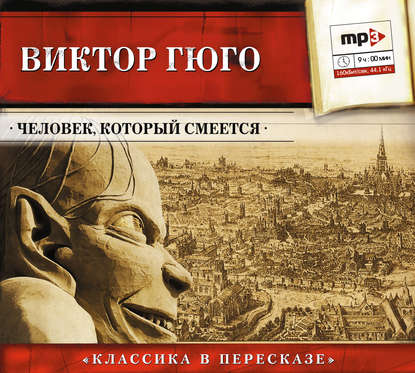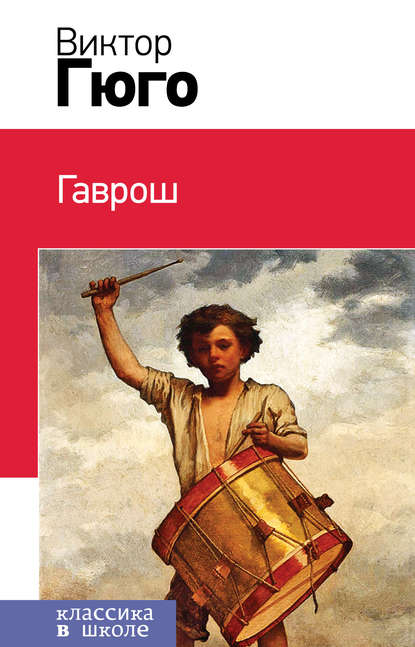
Полная версия
The Man Who Laughs
He was about to turn and wander long, perhaps, in the intersections of the Scrambridge lanes, where there were then more cultivated plots than dwellings, more thorn hedges than houses; but fortunately he struck into a passage which exists to this day near Trinity schools. This passage led him to a water-brink, where there was a roughly built quay with a parapet, and to the right he made out a bridge. It was the bridge over the Wey, connecting Weymouth with Melcombe Regis, and under the arches of which the Backwater joins the harbour.
Weymouth, a hamlet, was then the suburb of Melcombe Regis, a city and port. Now Melcombe Regis is a parish of Weymouth. The village has absorbed the city. It was the bridge which did the work. Bridges are strange vehicles of suction, which inhale the population, and sometimes swell one river-bank at the expense of its opposite neighbour.
The boy went to the bridge, which at that period was a covered timber structure. He crossed it. Thanks to its roofing, there was no snow on the planks. His bare feet had a moment's comfort as they crossed them. Having passed over the bridge, he was in Melcombe Regis. There were fewer wooden houses than stone ones there. He was no longer in the village; he was in the city.
The bridge opened on a rather fine street called St. Thomas's Street. He entered it. Here and there were high carved gables and shop-fronts. He set to knocking at the doors again: he had no strength left to call or shout.
At Melcombe Regis, as at Weymouth, no one was stirring. The doors were all carefully double-locked, The windows were covered by their shutters, as the eyes by their lids. Every precaution had been taken to avoid being roused by disagreeable surprises. The little wanderer was suffering the indefinable depression made by a sleeping town. Its silence, as of a paralyzed ants' nest, makes the head swim. All its lethargies mingle their nightmares, its slumbers are a crowd, and from its human bodies lying prone there arises a vapour of dreams. Sleep has gloomy associates beyond this life: the decomposed thoughts of the sleepers float above them in a mist which is both of death and of life, and combine with the possible, which has also, perhaps, the power of thought, as it floats in space. Hence arise entanglements. Dreams, those clouds, interpose their folds and their transparencies over that star, the mind. Above those closed eyelids, where vision has taken the place of sight, a sepulchral disintegration of outlines and appearances dilates itself into impalpability. Mysterious, diffused existences amalgamate themselves with life on that border of death, which sleep is. Those larvæ and souls mingle in the air. Even he who sleeps not feels a medium press upon him full of sinister life. The surrounding chimera, in which he suspects a reality, impedes him. The waking man, wending his way amidst the sleep phantoms of others, unconsciously pushes back passing shadows, has, or imagines that he has, a vague fear of adverse contact with the invisible, and feels at every moment the obscure pressure of a hostile encounter which immediately dissolves. There is something of the effect of a forest in the nocturnal diffusion of dreams.
This is what is called being afraid without reason.
What a man feels a child feels still more.
The uneasiness of nocturnal fear, increased by the spectral houses, increased the weight of the sad burden under which he was struggling.
He entered Conycar Lane, and perceived at the end of that passage the Backwater, which he took for the ocean. He no longer knew in what direction the sea lay. He retraced his steps, struck to the left by Maiden Street, and returned as far as St. Alban's Row.
There, by chance and without selection, he knocked violently at any house that he happened to pass. His blows, on which he was expending his last energies, were jerky and without aim; now ceasing altogether for a time, now renewed as if in irritation. It was the violence of his fever striking against the doors.
One voice answered.
That of Time.
Three o'clock tolled slowly behind him from the old belfry of St. Nicholas.
Then all sank into silence again.
That no inhabitant should have opened a lattice may appear surprising. Nevertheless that silence is in a great measure to be explained. We must remember that in January 1790 they were just over a somewhat severe outbreak of the plague in London, and that the fear of receiving sick vagabonds caused a diminution of hospitality everywhere. People would not even open their windows for fear of inhaling the poison.
The child felt the coldness of men more terribly than the coldness of night. The coldness of men is intentional. He felt a tightening on his sinking heart which he had not known on the open plains. Now he had entered into the midst of life, and remained alone. This was the summit of misery. The pitiless desert he had understood; the unrelenting town was too much to bear.
The hour, the strokes of which he had just counted, had been another blow. Nothing is so freezing in certain situations as the voice of the hour. It is a declaration of indifference. It is Eternity saying, "What does it matter to me?"
He stopped, and it is not certain that, in that miserable minute, he did not ask himself whether it would not be easier to lie down there and die. However, the little infant leaned her head against his shoulder, and fell asleep again.
This blind confidence set him onwards again. He whom all supports were failing felt that he was himself a basis of support. Irresistible summons of duty!
Neither such ideas nor such a situation belonged to his age. It is probable that he did not understand them. It was a matter of instinct. He did what he chanced to do.
He set out again in the direction of Johnstone Row. But now he no longer walked; he dragged himself along. He left St. Mary's Street to the left, made zigzags through lanes, and at the end of a winding passage found himself in a rather wide open space. It was a piece of waste land not built upon – probably the spot where Chesterfield Place now stands. The houses ended there. He perceived the sea to the right, and scarcely anything more of the town to his left.
What was to become of him? Here was the country again. To the east great inclined planes of snow marked out the wide slopes of Radipole. Should he continue this journey? Should he advance and re-enter the solitudes? Should he return and re-enter the streets? What was he to do between those two silences – the mute plain and the deaf city? Which of the two refusals should he choose?
There is the anchor of mercy. There is also the look of piteousness. It was that look which the poor little despairing wanderer threw around him.
All at once he heard a menace.
Конец ознакомительного фрагмента.
Текст предоставлен ООО «ЛитРес».
Прочитайте эту книгу целиком, купив полную легальную версию на ЛитРес.
Безопасно оплатить книгу можно банковской картой Visa, MasterCard, Maestro, со счета мобильного телефона, с платежного терминала, в салоне МТС или Связной, через PayPal, WebMoney, Яндекс.Деньги, QIWI Кошелек, бонусными картами или другим удобным Вам способом.
1
As much as to say, the other daughters are provided for as best may be. (Note by Ursus on the margin of the wall.)
2
Una nube salida del malo lado del diablo.
3
Tiller of the mountain, who is that man? – A man.
What tongue does he speak? – All.
What things does he know? – All.
What is his country? – None and all.
Who is his God? – God.
What do you call him? – The madman.
What do you say you call him? – The wise man.
In your band, what is he? – He is what he is.
The chief? – No.
Then what is he? – The soul.
4
Traitors.
5
The above is a very inefficient and rather absurd translation of the French. It turns upon the fact that in the French language the word for darkness is plural —ténèbres. – TRANSLATOR.
6
Transcriber's note: The original text refers to "vitres épaisses", thick panes, without specific dimensions. Glass only a millimetre thick would have been rather flimsy.
7
Gaufrier, the iron with which a pattern is traced on stuff.
8
Art thou near me?
9
Côtes, coasts, costa, ribs.












